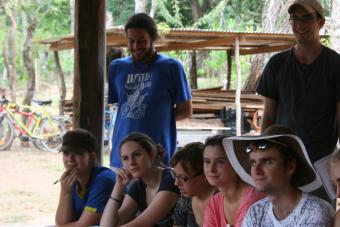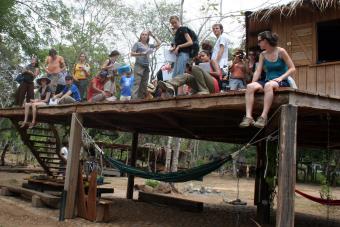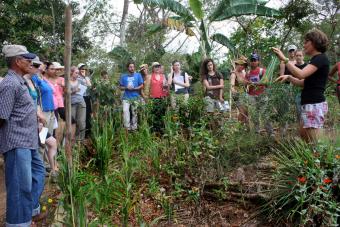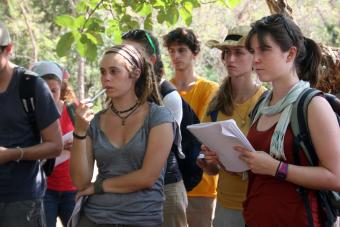North-South-Dialogue with McGill University
North-South-Dialogue with McGill University
March 31st, 2012
On the afternoon of the 31st of March 2012, William, the man for everything on lo tuyo, began preparing his culinary fireworks. The occasion was the visit of a group of college students from English speaking McGill University in the French part of Canada. On the homepage of this renowned university there is a long list of graduates that are now well known personalities in the natural sciences, politics, and culture. As part of the interdisciplinary course of sustainable tropical agriculture, the university offers an internship semester in Panama every year.
Under the supervision of professor Dr. Kushalappa "Kush" Ajjamada 28 students travelled to Las Lajas, among them two guest students from Panama. The group included students studying environmental science, international relations, biology, and philosophy.
Silke’s daughter Kaya, who studies forestry in Germany and is a near native English speaker, met the group. Kaya was living on lo tuyo in order to work on her thesis about the organic cultivation of tomatoes in the tropics. The group was welcomed with a choice of either steaming ñahu coffee or cold cashew-juice. Ñahu is the caffeine free seed of the okra-pod. The drinks were prepared and served by Hanna, the lo tuyo manager, and Alice, our creative volunteer. Talking about the body’s well being, the visit seemed to be "cashew" themed anyway- with the drinks came dried cashews, straight out of the dryer (completed in January 2012), which was also shown to the students.
The lo tuyo house on stilts served as a resting place and auditorium, where Kaya and Hanna received the first wave of questions. Answers were eagerly written in notebooks. They liked the concept of refining and conserving fruits and vegetables, and the idea of organic baby food got especially good feedback.
Next was the vegetable garden, although at the end of the dry season there wasn’t much to see: “the dry season is the time when the vegetation gets a chance to rest”, explained Kaya, “similar to winter in the North”. But since lo tuyo lies in the tropics, there was still plenty to see: bright flowers, fragrant lemon grass, green even in the dry season, manioc bushes, and tons of information. For the first time many of the students were able to see the wonder plants of tropical permaculture, like the edible pigeon pea guandú or the effective ground cover plant maní forrajer. Using red hot chilli pepper as an insecticide was new to many. Professor Kush examined Kaya’s sickly tomatoes and offered some suggestions.
Hojier, our wise organic farmer, as Guillaume fittingly called him, introduced the fascinating world of composting. For this he used a machete, the multipurpose tool of the tropics, as a thermometer. Stuck deeply into the pile, he was able to test the temperature on the inside. Hojier is local. In the future we want to try to engage him in the areas of environmental education and seminars on organic farming in the tropics.
Brains working make one hungry, and so came the real food: the lo tuyo team was prepared to serve freshly harvested and cooked manioc and cashew chutney - simply delicious – and William’s grand act: he placed the cashew nuts, which can be found underneath the pear shaped fruit on a heated iron sheet over the fire, where they began smoking voraciously. Thick black clouds rose up, and the poisonous ethereous oils came shooting out in bright little bursts of fire. William, fun loving as any latino, warned with a loud “Cuidado!" before he sent the hot nuts flying towards the students. Everyone had fun peeling the freshly roasted nuts out of their shells.
The two hours planned for the visit had turned into four. Professor Kush was impressed with everything that had been achieved here in so little time: “I would like to come back to visit lo tuyo again with a group of students in 2013. What can be seen here is very relevant to the course.” And to the students he added “If any of you plan to work on a similar project in the future, use lo tuyo as an example!”




